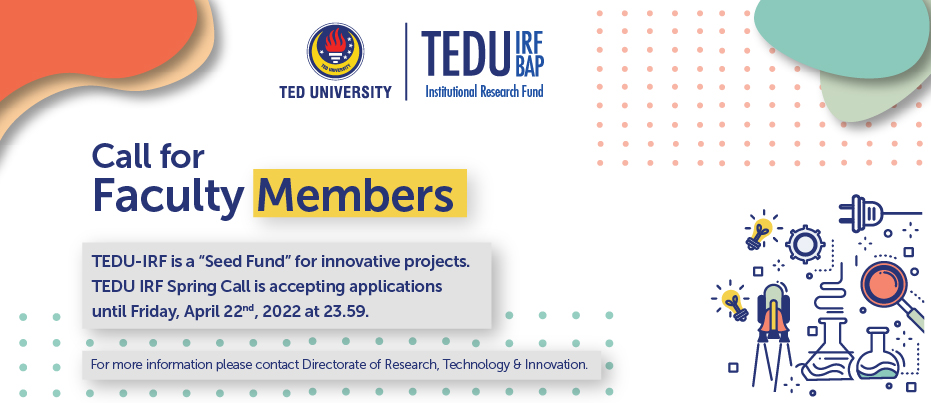Institutional Research Fund (TEDU-IRF) 2021-2022/II

TEDU - IRF is one of the research endorsements provided by TED University to support and enhance research at TEDU. TEDU-IRF also acts as a “Seed Fund” for faculty members. By making an application to TEDU-IRF, researchers pledge that no double-funding[1] exists for the budget items proposed in the application.
Criteria for Proposals:
For the scientific excellence and impact, the project proposals are expected to;
- support institutional strategy, principles, and research priorities of TEDU
- make a significant contribution to science and society
- possess strong, authentic and novel scientific quality
- have a potential to advance the state-of-the-art and generate new intellectual property
For the quality and efficiency of the implementation; the project proposals are expected to;
- have sufficient and relevant resources to develop its activities in the most suitable conditions
- define clear, realistic and achievable project goals, methodology and outputs
- allocate the tasks and resources with respect to time and budget properly with relevant justifications
Contribution to Sustainable Development Goals (SDGs)
In the application form, the applicants are expected to indicate whether the project contributes to United Nations Sustainable Development Goals or not. If the project contributes to any of the SDGs (of which the details are available on (https://sdgs.un.org/goals), it should be explained under the “Contribution to SGDs” section in detail and “TEDU Sustainable Development Goals” Form should be filled and uploaded to the system.
According to the assessment of TEDU-IRF Commission; the projects which contribute to SDGs will be rewarded with an additional 5 points on top of the Final Assessment Score.
Contribution to Sustainable Development Goals (SDGs)
In the application form, the applicants are expected to indicate whether the project contributes to United Nations Sustainable Development Goals or not. If the project contributes to any of the SDGs (of which the details are available on (https://sdgs.un.org/goals), it should be explained under the “Contribution to SGDs” section in detail and “TEDU Sustainable Development Goals” Form should be filled and uploaded to the system.
According to the assessment of TEDU-IRF Commission; the projects which contribute to SDGs will be rewarded with an additional 5 points on top of the Final Assessment Score.
Funding Information:
Maximum amount of budget for each project cannot exceed TL 40,000 (excluding VAT).
Duration:
The maximum duration of projects are 24 months.
Eligibility Criteria:
Applications are accepted from TEDU full-time faculty members. Principle Investigators (PI) of ongoing IRF projects are not eligible to submit new applications. New applications are not permitted to the subsequent IRF call, if a funded PI fails to submit its final report within the project time-frame.
How to Apply:
Applications will be made through TEDU Portal according to the instructions given in this Call for Proposals document and TEDU-IRF Directive. To access the IRF Application Form; open
[1] The situation where the same costs for the same activity are funded twice
Research Endorsements tile/app in TEDU Portal and select “Create Application”. Please don’t forget to select “Institutional Research Fund” as Project Type.
Required Documents which should be uploaded to the system:
The following documents must be uploaded to the system in order to make the application pass the conformity assessment and advance through the scientific evaluation phase.
- Literature Review (max. 5 pages)
- Timetable (Project Calendar)
- Budget Plan
- Risk Analysis (Technical, Operational, and Financial Risks should be mentioned -where relevant- and respective mitigation actions & contingency plans should be proposed)
- Proforma Invoices (for the budget items other than student support)
After the project is decided to be funded, the following documents should be prepared and delivered to ATID within 60 calendar days from the date of project acceptance letter.
- If the proposed project topic contains ethical issues: Ethics Committee Approval/Ethics exemption letters
- Other required Legal/Institutional Permissions (if third party infrastructure or Intellectual Property will be used in the project)
- Letter of Intent (required in the case of collaboration with other institutions)
Student Support Rates:
This budget item should be calculated by using following unit cost per working hour rates:
- Undergraduate Student who already has social security registration à maximum 20 hours per month with TL 12.5 /hr (gross pay)
- Undergraduate Student who does not have any prior social security registration à maximum 40 hours per month with TL 12.5 /hr (gross pay)
- Graduate Student who already has social security registration à maximum 20 hours per month with TL 29.5 /hr (gross pay)
- Graduate Student who does not have any prior social security registration à maximum 40 hours per month with TL 29.5 /hr (gross pay)
Important Issues:
- TEDU undergraduate and graduate students with active “Working Scholarship” bursaries cannot be proposed under “Student Support” budget item.
- Application form and literature review must be in English.
- Before deciding equipment, software & service pro. budget items that will be requested within the project; it should be first ensured that those are not available for use within TEDU premises.
- Travel item should be used only for realization of project activities, not for dissemination purposes (conference/training/workshop participation). TEDU-KAF and/or Congress Participation Support Program for Undergraduate and Graduate Students (Budget Code: T-21-B2024-31572) are in place for conference/training/workshop participation.
- Please do not include your personal information in the content of neither the application form nor the mandatory documents.
Please refer to Inst. Directive to learn more about TEDU-IRF which was revised on 23rd September 2021.
For more information and language support please contact Directorate of Research, Technology & Innovation.
Tarih: -